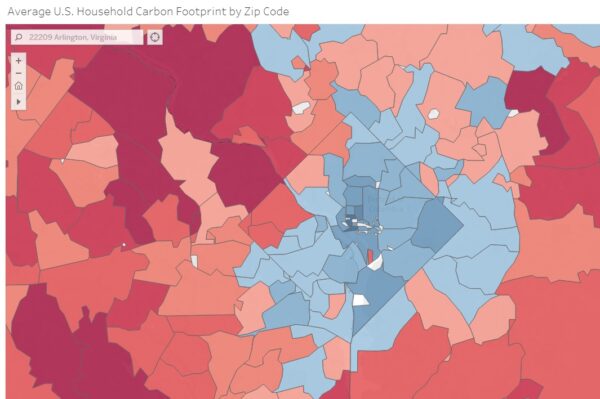Making Room is a biweekly opinion column. The views expressed are solely the author’s.
From flash floods in Arlington to wildfires on the West Coast, climate change is an increasing threat to life and property. This is not a future problem, but a current crisis. We have only a few years to reverse human-made emissions.
Transportation is one of the United States’ largest contributors to greenhouse emissions. Helping people drive less must be part of any climate change solution. Research also shows that multifamily housing requires less energy to heat and cool compared to detached homes. The densest parts of the D.C. region also have the lowest per-person energy consumption. The best thing we can do for our planet, for ourselves and for the next generation is to allow more people to live in these low-carbon neighborhoods.
But density and urban development is sometimes demonized by self-described environmental activists. Some groups focus only on the loss of trees in urban neighborhoods, ignoring the acres of trees that are bulldozed for sprawl development and the broader climate benefits of compact communities.
Douglas Stewart, Transportation and Smart Growth Co-Chair for the Virginia Sierra Club, shares how environmentalists and anyone concerned about sustainability can advocate for housing policies that will help address climate change:
The Sierra Club recognizes that we can’t address climate change without addressing our nation’s housing crisis. The lack of diverse, affordable housing options in developed areas with transit networks where jobs and services are concentrated is a major factor in increasing greenhouse gas emissions. Locating housing farther away from these centers increases traffic and, in Virginia’s transportation sector, accounts for 48% of carbon dioxide emissions.

“Infill” is the development of new homes, jobs, shops and services in existing urban and suburban areas and small towns. By enabling people to live closer to jobs and services, infill development reduces driving and greenhouse gas emissions while providing other quality of life and economic benefits. Research by the Coalition for Smarter Growth has demonstrated that more compact development reduces greenhouse gas emissions by 10-40%. Other research has shown that more compact, mixed-use communities also reduce household transportation costs, which are often the second biggest household expense after housing.
Arlington has 11 Metrorail stations, around which more housing could be built, including housing that is affordable to lower-income residents. However, a recent report by the Brookings Institution indicates that a large proportion of new housing is in areas that have fewer jobs and transportation options, such as Loudoun and Prince William Counties, while job-rich areas like Arlington are not building enough housing.
Arlingtonians who are concerned about climate change and equity can help reverse this trend and focus on new growth in walkable, transit-oriented communities with a range of housing options for all incomes. With 3.8 million members, the Sierra Club works to advance climate solutions and ensure everyone has access to clean air, clean water and a healthy environment. The Sierra Club derives its grassroots power from members and volunteers in local groups and state chapters, including the Potomac River Group that covers Arlington, Alexandria and Falls Church.
The Sierra Club has published a new guidance document to help its volunteers advocate for housing development that is both equitable and environmentally sustainable. The Urban Infill Guidance provides an overview of how land-use decisions get made, how to get involved in the decision-making process and what types of housing proposals local Sierra Club members should support and oppose.
The report focuses on local and state-level actions that Club volunteers can take to help expand housing options and focus on new development in the right places. The recommendations include:
- Providing incentives to finance more affordable housing production near transit stations
- Increasing local and state funding for affordable housing preservation and development
- Incorporating inclusionary zoning tools to incentivize or require developers to create below-market rental apartments or for-sale homes in connection with the local zoning approval of a proposed market-rate development project
In Arlington, the Sierra Club has ample opportunity to apply these recommendations through advocacy and community outreach in partnership with the Northern Virginia Affordable Housing Alliance (NVAHA) and other housing and smart growth organizations.
Jane Fiegen Green, an Arlington resident since 2015, proudly rents an apartment in Pentagon City with her family. By day, she is the Membership Director for Food and Water Watch, and by night she tries to navigate the Arlington Way. Opinions here are her own.


